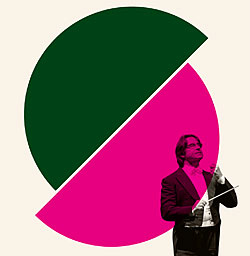
Opera conductors can seem like vaguely superfluous figures, lurking below the lip of the stage, desperately trying to coax a pit band, wayward divas, and creaky sets into a semblance of synchronicity. Yet the maestro is the divinity of these artificial worlds, armed with a bolt-throwing baton and marking a life-giving beat. Riccardo Muti and James Levine each returned to the podium recently after struggles with infirmity, and both demonstrated that no matter how dazzlingly detailed or lackluster or even absent the production, it is the conductor who unfolds each saga in sound. Muti, who collapsed from a heart arrhythmia in February, has lately been expressing doubts about his strange, wizardly profession. “What is it, really, I do?” he wondered in a recent speech. “I’ve wasted my entire life doing … ” And he waved an imaginary twig. Levine has voiced no such qualms, but persistent back pain and other health problems have forced him to cancel performances by the fistful, and each time the Met soldiers on, simultaneously declaring its loyalty to Levine and its faith that the company can get by just fine without him. But Muti’s concert performance of Verdi’s Otello with the Chicago Symphony Orchestra at Carnegie Hall and Levine’s performance of Die Walküre at the Metropolitan Opera made it clear that a conductor’s personality is not a fungible commodity. It matters who’s waving the stick.
Verdi opens Otello with an offstage tempest, and though the audience had nothing to look at besides a stageful of stiff musicians in formal dress, Muti—leading one of the most nuanced and combustible performances I’ve ever heard—unleashed enough musical current to power a small city for a week. Those woodwind gusts, brass crashes, and juddering string waves announce the title character’s roiling mind and the cataclysmic force of his misery, and Muti brought out the brooding restlessness, the sense that each ferocious climax was merely a prelude to an even more explosive shock. We tend to think that great opera depends on vocal feats, but though Aleksandrs Antonenko sang Otello with a hot, forceful tenor and Krassimira Stoyanova savored Desdemona’s exquisite desolation, what lingers in the mind from that amazing night is not an aria or a voice, or the sumptuous violence of a choral outburst, but the opera’s hushed intimations of an abyss, when the harmonic terrain rearranges itself atop liquid flows of cellos, basses, and low brass. In Act III, Desdemona answers Otello’s rage in quiet stupor—“Esterrefatta, fisso lo sguardo tuo tremendo” (“Shocked, I meet your terrible gaze”)—and Muti made sure that the glacial sustained note in the oboes above a low, macabre march shone a lurid light on the devastating aria that follows. That, maestro Muti, is what you do.
The Muti era is just beginning in Chicago, while at the Met, Levine is celebrating his 40-year dominion even as his power is slipping away. This is the house that Jimmy built: He auditioned singers, constructed the orchestra, shaped the repertory, approved guest conductors, and signed off on productions. Today, he sows relief and reaps ovations for showing up. Levine is an unsettling mixture of potency and immobility these days. He spends the five hours of Die Walküre conducting with gymnastic vigor and undimmed élan—and then shuffles onstage for a curtain call looking ancient and spent, with a singer gripping each arm. On any given evening, it’s hard to predict whether force of will can vanquish physical debility. That situation can’t continue indefinitely.
In Die Walküre, Levine has to battle Robert Lepage’s grimly industrial staging of the “Ring,” which began last fall with Das Rheingold and will grind through the rest of the cycle next season. In the current episode, Carl Fillion’s computer-controlled behemoth of steel beams is back, providing the wrong sort of dramatic tension. Whenever it moves, or when Wotan—the beefy Bryn Terfel—steps onto a slat, the set groans and bobbles like a Cuban Chrysler. On opening night, Deborah Voigt as Brünnhilde tried to sprint up a slope, tripped, and slid back down on her stomach, causing her to grin sheepishly through her “Hojotoho!” battle cries. In this production, engineering has merged with interpretive idea, and the inadequacy of one exposes the shallowness of the other. The singers exist to populate the scaffolding, and Lepage leaves them to muddle through with their awkward poses and thrift-store breastplates.
Fortunately, the cast mostly ignores Lepage and focuses on Wagner and Levine. Jonas Kaufmann sings the impetuous, incestuous Siegmund with bracing urgency and warmth. Voigt gives Brünnhilde a steely joy, Stephanie Blythe sings Fricka with ferocious splendor, and Eva Maria Westbroek, who pleaded illness and bowed out midcourse on opening night, hinted at a richly developed Sieglinde. Terfel’s Wotan finds the doubt and terror lurking in his character’s might, especially when he can stop bellowing over the roaring orchestra and savor the intimacy of a Wagner pianissimo.
The composer did not leave it to a director’s intuition to convey the emotional complexities that run through the opera; he engraved them in the score. In Act III, the tired old god Wotan considers the gulf between his self-destructive anger and Brünnhilde’s romantic fantasies. “In the ruins of my own world, I would end my infinite sadness,” he sings, as horns blast apocalyptically and violins and violas tumble through a clangorous diminished seventh, the chord of maximum ambivalence. Then, as his thoughts flit to his child’s sweet ecstasies, his softened voice slips into a serene A-flat major chorale. In passages like this, which Lepage passes over, Levine steps in as protector of subtlety, linking these contrasting passages in one broad breath.
Wagner, who formed an operatic world with himself as its sovereign, also defied fierce regimes and was punished for it. Like Wotan, he understood something about the dangerous volatility of power. So, surely, does Levine, and there is something simultaneously poignant and thrilling in watching the wounded potentate conduct the tale of the weakened god.
Die Walküre
By Richard Wagner.
Metropolitan Opera.
Through May 14.
